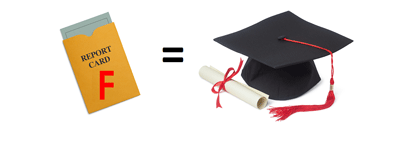The evidence is clear. The practice of promoting Baltimore City Public School students to successive grades despite their apparent failure to master their contemporaneous grade level curriculum is abysmal, counterproductive and shameful.
Essentially, “Social Promotion” advances and matriculates students based on three loosely defined criteria: behavior, attendance and engagement. If a student displays no egregious or outrageous disciplinary conduct, attends school more regularly than the most truant students – an amorphous standard, and demonstrates an interest in learning or a rudimentary understanding of the subject matter, he’s ‘successful’, and moves on to the next grade or graduates.
A review of first year college performance for too many Baltimore City high school students graduating at the top of their classes will reveal that despite their ‘superior’ academic status compared to their classmates many may require remedial education to become fully competitive in a higher learning environment.
Unfortunately, the practice of Social Promotion is so old and pervasive it has created several generations of ‘professionals’ and para-professionals whose communication skills are not sufficient to master their own native English language. This includes a few teachers.
Current Baltimore students are sometimes ‘learning’ from teachers who are not sufficiently learned themselves to teach speaking, writing and comprehension as dynamic subject matter, never mind providing instruction that would lead the average student to a high achievement of language eloquence.
Baltimore students’ inability to articulate their native language fluently is further exacerbated by the long-time cultural stigma associated with communicating effectively referred to as “talking white.” This may be true of some of their teachers as well who have encountered that same stigma in their earlier development as they themselves ‘progressed’ through Social Promotion during their own Baltimore City public school experiences.
Over one million immigrants from every continent come to America every year to seek their fortune, armed with superb aptitudes, skills, abilities and education. However, without a firm grasp of the standard American English language they would never be successful. The language shunned as “uncool” when spoken properly by too many native-born Americans is coveted as invaluable by newly arrived immigrants.
Social Promotion does not emphasize the critical communication skills students will eventually need to successfully navigate the educational, social, cultural and commercial worlds that await them, in America and in the global economy.
Due in part to the shortage of entry level American workers with strong communication skills corporations have outsourced millions of customer service call center jobs overseas primarily to Central and South American, European and Asian workers.
Even though the current focus is on STEM— Science, Technology, Engineering and Mathematics— these professional paths are not alternatives for students who are not thoroughly fluent in English communication.
Whose idea is it— and why— to continue Social Promotion in lieu of sound, rigorous academic preparation, as the standard that has rendered generations of urban students incapable of competing in the world economy, or even in their homegrown communities as engaged citizens?
Why aren’t students informed that mastering their native language can open up a world of opportunity tantamount to the success of some of their favorite sports and entertainment idols. There are performers and athletes who will substantiate that despite their level of success as viewed by the world, their potential to achieve their greatest success may have been stifled due to lack of a more thorough education, notably communication skills.
The international language of business, English acumen is not only the ticket to local academic and professional advancement but a ticket to success in the global culture and economy. An examination of Baltimoreans who have completed their secondary public school education or have been marginalized by Social Promotion, will show:
*Less than 55 percent of Baltimore residents have a high school diploma
*Roughly 30 percent have a college degree
*Officially, 15.9 percent or one in six are functionally illiterate
*Median household income is $46,600 (U.S. median income $61,400)
*Overall unemployment 5.6 percent (African American unemployment 14 percent)
*Underemployment (regionally) 34.3 percent
*Nearly one in four live in poverty
While people on the losing end of Social Promotion might argue that the glass is less than half empty, there is an argument to be made— albeit ominous— that the ‘victims’ of Social Promotion make the glass more than half full for the rest of society, relative to how slavery functioned.
Not only will the undereducated not compete for limited classroom space and financial resources for college and advanced job training, and by extension prime employment opportunities, they will likely never compete for the chance to live in better housing or achieve home ownership.
Most recipients of Social Promotion, based on current statistics, will likely
become members of the perpetual underclass, the permanent class of consumers whose role in society is to routinely recycle money into the economy on subsistence wages and government assistance, profiting the merchant class and powering the urban economic treadmill.
For Baltimore students, and the city at-large, Social Promotion is a societal demotion spelled— f-a-i-l-u-r-e.
West Baltimore native, Regi Taylor is a married father of four. He is an artist, writer and media professional specializing in political history.
